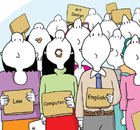Global Biz
More than half Americans spend less money in stores - poll
(Xinhua)
Updated: 2010-01-03 15:02
 |
Large Medium Small |
NEW YORK: A recent New York Times/CBS News poll has found that more than half of Americans said they are spending less money in stores and online.
A New York Times report available on its website Saturday quotes the poll as saying that nearly half of Americans said they were spending less time buying nonessentials.
The report also quotes the US Department of Labor's time-use survey as showing that compared with 2005, Americans spent less time in 2008 buying goods and services and more time cooking or taking part in "organizational, civic and religious activities."
However, people spent more time on cultural events last year, says the Times. "While one new study shows that attendance at museums and cultural events dropped from 2002 to 2008, it has climbed in 2009 at many major institutions, including the Museum of Modern Art in New York and the Art Institute of Chicago. Movie attendance was also up 5 percent in 2009."
"It's a different kind of recession," the paper quotes Richard Florida, the author of several best-selling books about the economics of cities as saying. "It's not like in the '30s when people stopped going to concerts. Now people seem to be keeping up with experience consumption and cutting back on other necessities."
There are, of course, potential problems as the United States drops old habits of consumption, says the paper. "On the macro level, economists worry that it could undermine a recovery."











